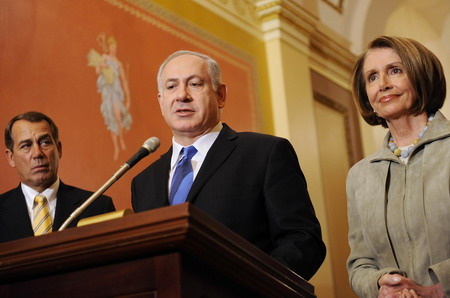Global General
US, Israel fail to reach deal on settlement plan
(Xinhua)
Updated: 2010-03-25 15:25
 |
Large Medium Small |
 Israeli Prime Minister Benjamin Netanyahu (C) makes remarks to reporters before meeting with House Minority Leader John Boehner (R-OH) (L) and House Speaker Nancy Pelosi (D-CA) (R) at the US Capitol in Washington, March 23, 2010. [Agencies] |
WASHINGTON - The United States did not reach agreement with Israel over the latter's settlement plan after two days of visit by Israeli Prime Minister Benjamin Netanyahu on Wednesday.
The talks between Netanyahu and US Middle East envoy George Mitchell concluded but did not heal the dispute between the two countries, US officials were quoted by the Associated Press as saying.
| ||||
On Tuesday, Netanyahu held talks with US President Barack Obama, who asked Netanyahu to build confidence for the Middle East peace talks.
The United States has demanded that Israel reverse new housing plan in East Jerusalem, which Netanyahu has so far rejected. The US-brokered indirect talks between Israelis and Palestinians are currently stalled as the Palestinians refused to negotiate unless Israel stops building in East Jerusalem.
The Obama administration, which has been trying its best to push the Israeli-Palestinian peace talks, was angry over the Israeli government's approval of 1,600 homes in East Jerusalem on March 9 when US Vice President Joe Biden was pushing both Israel and the Palestinians to resume peace talks.
Both Biden and Secretary of State Hillary Rodham Clinton issued condemnation on the Netanyahu-led government for the move, which was described by Clinton as "an insult" and "a deeply negative signal" about Israel's approach to relations with Washington.
Before the meeting with Obama, Netanyahu told the AIPAC conference that building more houses in the Jewish neighborhoods "in no way precludes the possibility of the two-state solution," stressing that Jerusalem is not a settlement, but the eternal capital of Israel.
The Palestinians insists that the peace talks will not be resumed until the Israeli government totally freezes the Jewish settlement activities in the West Bank and East Jerusalem, while the Israeli government claims to ensure the "natural growth" of the Jewish settlements.










